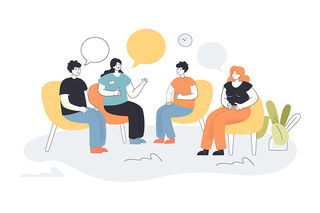Motivation
Why You Should Try Group Therapy
3 types of group therapy—and which one may be right for you.
Posted August 2, 2021 Reviewed by Abigail Fagan
Key points
- Support group therapy involves meeting with people navigating the same issues and speaking to them about why you joined the group.
- Psychoeducational group therapy teaches you about your condition and helps you develop coping skills.
- Process or working group therapy focuses on collaborative discussion and interpersonal processes.

You’re probably already familiar with individual therapy. Whether you’ve done it weekly for years or you’ve never walked into a therapist’s office, you know how it works. You sit down and pour your heart out to someone one-on-one or, in the case of couple’s therapy, two-on-one. What you might be less familiar with is group therapy.
There are three primary types of group therapy: the support group type, the psychoeducational type, and the process or working type. I’ll discuss what differentiates these different kinds of treatment and their benefits and why group therapy may be right for you.
Support Group Therapy
In support group therapy, you meet with people dealing with the same issues as you, and you talk to them about why you joined the group, your current struggles, and your goals. Alcoholics Anonymous and Al-Anon are two examples of support groups. In this type of therapy, the primary goal is to encourage each other to move forward in recovery. Members offer you words of motivation and compassion, and you share your story with them. In support groups, you can meet people who are further along in their recovery, which may give you a sense of hope for your future. You can see first-hand how group therapy helps people. Members often drop in and out, and you might find yourself with a new group of people from one session to the next.
One benefit of support groups over other types of group therapy is that often with this type, you can join at any time. The group leader is there to kick off sessions and move the meeting forward, but they don’t teach or encourage extensive interaction between members. Leaders of group therapy meetings are usually not licensed mental health professionals.
Psychoeducational Group Therapy
The purpose of psychoeducational group therapy is to teach you about your condition and help you develop coping skills. Groups typically focus on one issue such as anxiety, depression, bipolar disorder, or anger management. Typically, you meet once a week for one to two hours. You learn about your condition from a professional with training in psychotherapy or counseling, and they teach you skills to overcome or manage whatever issue you’re dealing with. The teacher may give reading or homework — things you can do during the week to further your progress in between sessions.
Cognitive Behavioral Therapy (CBT) is often the treatment taught in psychoeducation groups. Through CBT, you learn to identify, challenge, and change cognitive distortions. CBT focuses on immediate problems and is action-oriented. You come away with this type of therapy with the tools and knowledge to help with your recovery.
Process/Working Group Therapy
In process or working group therapy, members aren’t there just to offer support and sympathy or to learn more about their condition. Process or working groups are focused on interpersonal processes. Members encourage each other in self-exploration. They challenge each other and discuss their issues in a back-and-forth manner.
The group leader is often a licensed mental health professional, but their primary goal isn’t to impart wisdom but to facilitate the conversation. Conversations can flow naturally from topic to topic, and members can jump in at any time or sit and listen. Members may share their personal experiences, offer advice and compassion, and learn from one another.
When Group Therapy May Be Right for You
In-patient and partial-hospitalization programs usually include one or more types of group therapy because groups offer things that one-on-one therapy cannot. One of the primary goals of group therapy is to bring people together who share similar experiences or deal with similar issues. Groups can include people at different recovery stages, which can be especially helpful to people just starting their recovery. You can see what group therapy can accomplish and meet people who have had positive treatment outcomes.
Whether you’re dealing with depression, anger, or another difficulty, spending time with people dealing with the same issues as you can be tremendously valuable if you feel isolated or abandoned. You can find comfort, strength, and inspiration, learn new skills, receive guidance, and develop connections in group therapy — all benefits of meeting with many people rather than just one therapist. In group therapy, you see that you’re not alone.


